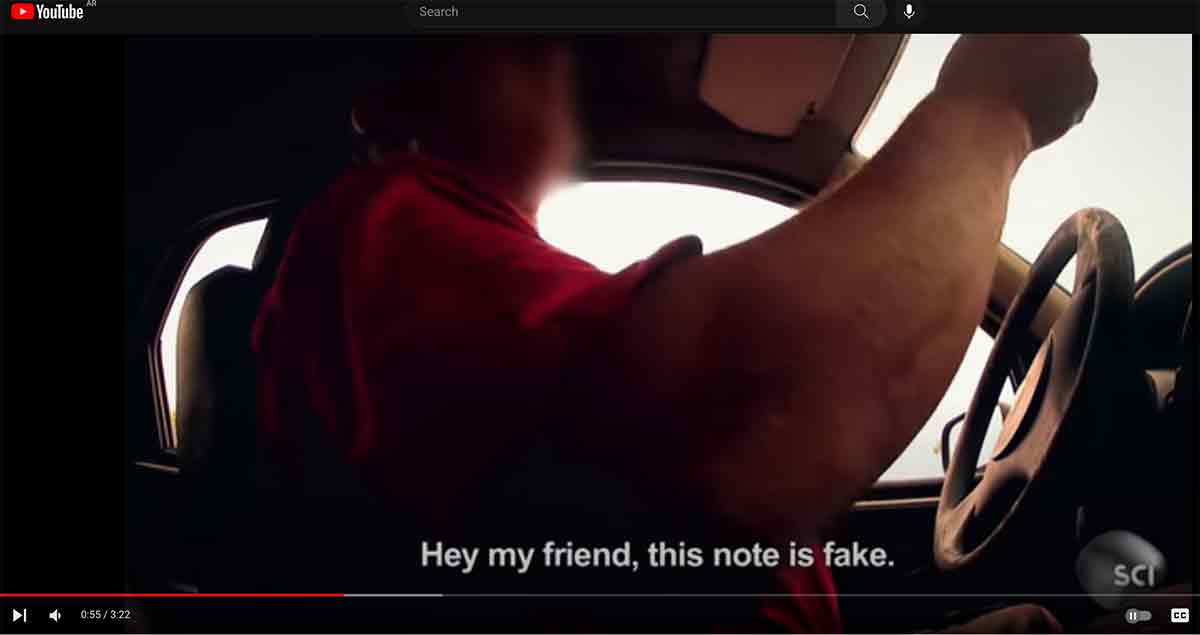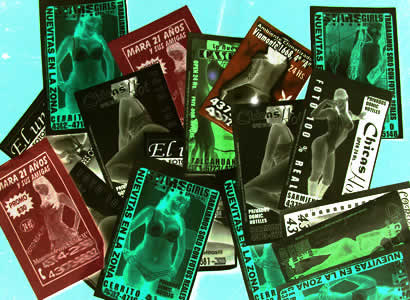Travel is one of life’s great pleasures, but sometimes being a new face in a strange place can make travelers vulnerable to local scams.

Argentina is no different in this respect.
In bustling cities like Buenos Aires, familiarizing yourself with common tricks can significantly reduce the chances of falling victim to a scam.
Luckily, many of the common tricks played on unsuspecting travelers here are well-known.
Becoming acquainted with them makes one much less likely to become a victim of a street-side swindle.
Forewarned is forearmed, so read on to become familiar with the most common swindles in Buenos Aires, and to a lesser extent, the rest of Argentina.
1. Watching out for Counterfeit Money and Sneaky Banknote Tricks
The bank note switcheroo is a scam that used to be one of the most common to encounter in Buenos Aires.
It works like this: you try to pay your taxi driver with a 1000 bill, he takes it, flicks it between his thumb and forefinger, then hands it back saying that it’s counterfeit or that he doesn’t have change.
Later when you try to use that note to pay for something else, you find out it’s a fake — the taxi driver switched your legitimate bill with a fake one.
Taxi drivers have any number of ways to make extra cash on the job and there are a few bad apples who prey on tourists in this way, and are well practiced in the maneuver of switching your real note for a fake one that they have hidden in their hand.
Now that the largest bill is $1000 and not worth much, the counterfeit money scam is not as common.
Cab drivers these days may have a sped up meter or take you on a gringo tour instead.
Read our post on taking a taxi in Buenos Aires ➡ to learn how to hail a cab, give directions and common taxi scams.

The program ‘Scam City‘ had a segment on how the counterfeit money scam in Buenos Aires works
Also be careful when someone gives you a bunch of notes as change for a purchase, because they can sometimes slip a fake bill in there, especially in night clubs and bars where it is dark and you’ve had a few too many mojitos.
How to avoid it: Familiarize yourself with the currency as soon as you arrive.
The fake notes are made from a different, thicker or slicker paper and usually don’t have the security devices such as the embedded metallic strip, the watermark face visible when holding a banknote up to light, and slightly raised print.
Also try to have smaller notes on hand to pay taxis the exact amount.
It’s best to ask the driver or any merchant, ‘¿Tenes cambio?’ (Do you have change?) before handing over a couple of $1000 notes.
You could also avoid dealing with taxis and paying in cash altogether by using Uber, Cabify or another ride-hailing service, although you will get the MEP rate, which is slightly lower.
2.Stay Alert: The Mustard Trick: The Art of Distraction
Distraction is another very common way tourists get robbed.
There are variations — the ‘mustard trick’ is also sometimes called the ‘bird poop scam.’ Those who have traveled in Europe are probably familiar with it.
The basic premise is this: you are walking along the street when suddenly you get sprayed with mayonnaise, mustard, or some other, less savory substance (excuse the pun) that you may presume is bird poop.
It could have come from a window above, somebody running past, or you may not even seen the culprit.
Annoyed and surprised, you start to clean yourself off.
Within seconds, a few friendly locals offer their help.
Perhaps an older lady (the accomplice is usually female) comes to help wipe off the offensive stuff with a handkerchief, or somebody who appears to live nearby offers to show you a place where you can clean yourself up.
In all the commotion, you get distracted and don’t notice that somebody has snatched your bag, wallet or purse.
Even if you do suddenly realize your stuff is gone, most of the people who were surrounding you take off in different directions, and you have no idea who to follow.
This scam is usually attempted in Buenos Aires around the Obelisco, along Avenida de Mayo (especially near 9 de Julio), the Plaza de Mayo and in the area around Recoleta Cemetery.
It is sometimes also perpetrated in other major Argentine cities around the downtown areas.
How to avoid it: Firstly, and this goes without saying, if you don’t look like an obvious tourist, you are less likely to be targeted.
Sometimes you need to take a quick peek at your phone in public, but at least try to avoid an Hawaiian shirt, socks and sandals ensemble.
If you do find yourself in the situation above, however, just get away from the scene as quickly as possible.
Don’t put down your bag to clean yourself off, and whatever you do, don’t follow anyone anywhere, because if they get you alone they will be able to rob you dry.
The reason this scam is so effective is that you can’t be sure who is genuinely trying to help and who is part of the production, so just move away.
It cannot be stressed enough that if someone approaches you offering help, especially if they suggest going to another location by claiming ‘there are police nearby,’ they likely serve as an accomplice with a ‘Plan B’ in mind.
3. Guard Against Deception: The Distressed Traveler

This one happens anywhere in the world where addicts need a fix.
In Buenos Aires it may go like this: a disheveled, overweight guy with sad blue eyes approaches you speaking excellent English.
He says he is Dutch or Belgian and seems friendly enough.
He proceeds to share a harrowing tale of being robbed, losing everything, including his money and passport and implores you to help him out like any decent human would.
The man in question is Fabian, a Dutch national who lives on the streets in Buenos Aires.
Sanja Haan from the Dutch consulate says, “We’ve known Fabian for years.”
She has gotten him emergency passports, helped him get admitted to the hospital to detox and also put him on the phone in an emotional phone call with his family, to speak with them for the first time in years.
A few years ago, some generous fellow compatriots bought ‘Fabi’ a ticket home, but between the time he was released from the hospital and had to get on the airplane, he got drunk and ended up missing the flight.
He first operated in Mendoza for many years, starting in the mid-2000’s.
We’ve been hearing about him for years, several readers even sent us their personal story (one, of which you can read here, if interested) and we have talked with him many times.
When his cover was blown in Mendoza, Fabian came to Buenos Aires, where he operates in tourists hot spots such as San Telmo and Palermo.
Many unsuspecting foreigners have given this Emmy Award-level scammer some ’emergency cash’, but it’s really for his beer fund.
He is in the late stage of alcoholism, and it is taking a toll on his health, especially since the antibiotics he is prescribed can’t be taken with alcohol.
Having missed his true calling as an actor, unless he changes, he will most likely meet an unpleasant fate on the streets of Buenos Aires.
How to avoid it: Obviously be wary of anyone feigning distress and asking for money on the street.
Not only could it be a scam but in the worst case scenario, a set-up for a robbery.
If you feel the person is genuinely in need, offer logistical help, such as making a phone call the social service helpline, 108.
In Fabian’s case, he has received plenty of help from strangers, his consulate and many public hospitals for professional detox. He did get admitted to a federally-funded rehab center at one point, but they won’t let him return because he bailed the first time.
The best any good Samaritan who comes across him can offer is to escort him to the hospital to detox, but if history is any indication, he will soon return to the streets and be out scamming for beer money again.
Sympathy Scams: The Business of Begging
Locals may also try to do sympathy scams, sometimes using children. Unfortunately sending children out to beg is a business for some.
The owner of this blog used to see the same children begging at the San Telmo Fair every week.
After buying a coat for one of the children who was shivering in a t-shirt in the cold, he returned the next week without his coat.
“Where’s your coat?”
“My mom said I earn more money without it,” he replied.
Lately there are some children out begging on the streets again, often approaching people while they are dining.
Considering the possibility that it could be an organized crime syndicate and puts children in danger, it’s best not to contribute.
Be cautious when approached by beggars while dining out, and keep a close eye on your belongings.
Even children can be skillful at distraction crimes, showing you items such as magazines to surreptitiously steal cellphones underneath.
It’s advisable not to place your cellphones on the table, lest you become the victim of an opportunity crime. Stay vigilant.
How to avoid it:
It’s hard when you see children who appear to be in distress, but it’s dangerous for children to wander the streets asking for money.
Experts say giving money encourages kids to be put in harm’s way.
In Buenos Aires and throughout the country the helpline ‘108’ is used to request a social services team to come to provide assistance for kids who are at risk or unaccompanied.
3. Hustled in Buenos Aires: The ‘Cabaret’ Bait-and-Switch Scam

Walking around downtown Buenos Aires and some other cities, you will sooner or later see people offering passing males ‘special offers’ for nearby ‘cabaret’ bars.
The flyers are also sometimes pasted to telephone poles.
If you are lonely or naïve enough to go down into one of these bars to accept your ‘free drink,’ you will probably find yourself in a situation like this: You sit down and the bartender hands you a beer.
No sooner have you taken a sip than a couple of scantily clad vixens have joined you and are making conversation (or saying stuff in Spanish that you don’t understand).
You smile smugly, knowing you have no intention of giving these girls any money, no matter how much they jiggle.
When you stand up to leave, you are confronted by some big oaf who claims that you have to pay.
“No, no,” you say, “I had the free drink special.” The oaf explains angrily that you have to pay for the girls’ drinks as well, which total up to $50 dollars each.
Laughing, you try to make your way to the exit, only to have it blocked by the gorilla and a couple of his friends, demanding your money.
To cut a long story short, no matter how much you argue, the staff will physically intimidate you until you hand over as much money as they ask for.
And don’t bother going to the police when you finally do get out of the place, because they will be strangely uninterested in your dilemma.
How to avoid it: Don’t walk into sleazy bars or brothels off the street without being forewarned
*Editor Update: Official Cabarets were outlawed in Buenos Aires 2016, which basically took this scam further underground.
Now these scams are more likely to take place in clubs called ‘privados’ that essentially function as walk-in ‘adult clubs’ throughout the city.
They are advertised on the internet and via little flyers with sexy pictures posted on telephone poles.
In general, outside of these establishments, men should be wary of most women that approach them with an unusually aggressive and suggestive demeanor (see the next scam below).
For more information about the ‘cabaret’ bait and switch and to see a video of how it works, see Money Exchange & Other Hustles on Florida St..
Cabarets still operate in other areas of Argentina, so the above advice holds true in the provinces.
Beware of ‘Black Widows:’ Drug-Facilitated Robberies in Buenos Aires
Everyone has heard stories and been warned about being drugged by strangers.
Usually it is women who are warned to be careful when accepting a drink from a new acquaintance.
The usual advice is to not take drinks from strangers and always watch a bartender pour the drink.
In Buenos Aires it is men — gay or straight — who are more likely to be victims of a drug-facilitated robbery.
A reader of this website, believes he was drugged with Scopolamine (aka ‘Devil’s Breath’ — which is unusual in Argentina) after striking up a casual conversation with a Venezuelan citizen in a cafe/bar in the Retiro neighborhood.
Scopolamine is a powder that can be added to a drink or blown into the face of a victim, rendering them disoriented and zombie-like.
Our normally street savvy friend describes falling into a childlike state, with no free will and being led around to different ATM’s, to remove the maximum limit at each one, until his bank account was empty.
His story was corroborated by cameras at the ATM’s. He was reimbursed by his travel insurance for the theft and luckily was unharmed.
Scopolamine, or burundanga, as it’s also known, is a particularly scary drug as it is tasteless and odorless. The scopolia plant is native to Columbia, and its use in robberies is more common there — it’s use in drug-facilitated robberies in Buenos Aires is rare.
Most often when men are drugged in Buenos Aires it is by ‘Viudas Negras‘ (Black Widows) — criminally-minded prostitutes that they bring home, either men or women.
Sometimes they pose as normal people on dating apps such as Tinder, and they often prefer foreigners, who are perceived to be well-to-do, as potential targets.
Victims get knocked out from their drink being spiked.
Hours later they wake up to find all of their items were stolen.
In one of the most tragic cases, a young Indian citizen living in Buenos Aires was killed, apparently due to an overdose, after he was slipped a sedative during the course of the crime.
Usually victims are drugged with crushed up Clonazepam or Valium, which is put into their drink.
Although NatGeo got busted scamming themselves — presenting scripted segments of their program ‘Scam City’ as real incidents — the TV show clip below gives insight into how the Buenos Aires ‘Black Widow’ scam works.
How to avoid it: Don’t take people you don’t know well —especially professional sex workers or even a first date — back to your apartment or hotel.
➡ That’s what Argentina’s love hotels, known as ‘telos’ are for!
—by Nico Sol
→ Do you need Travel Insurance for Argentina?